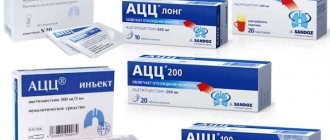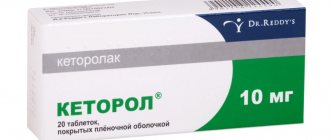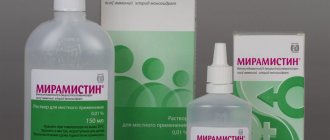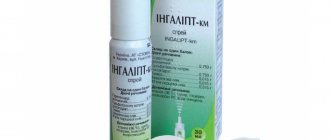During lactation, as during pregnancy, medications must be taken with caution. But if a headache, toothache or fever from a cold does not go away, we unconsciously reach for the first aid kit. Is it possible to use the familiar and familiar Analgin while breastfeeding? Will it harm the baby? Or does the benefit outweigh the possible danger? Let's find out the opinion of pharmacists and pediatricians.
Description of the drug
Analgin translated into Russian means “absence of pain.” It belongs to the group of drugs with non-narcotic effects, that is, it does not affect the psychological state of a person.
Metamizole sodium is the active ingredient of the drug. The pharmacy will offer you quite a lot of expensive medicines in beautiful packaging, but in the composition you will see the same metamizole natricum, or regular Analgin, only from a foreign pharmaceutical company and at a significantly inflated price.
The drug is prescribed for pain relief or lowering body temperature during colds or viral diseases. Analgin is effective if the pain syndrome is mild or moderate. But if the pain is very severe - burns, injuries, post-operative conditions - then other potent drugs are prescribed.
Analgin acts by inhibiting prostaglandins, substances in blood cells that act on the hypothalamus. Thus, the endocrine system independently regulates temperature.
Can Analgin be used while breastfeeding?
All people sometimes feel unwell, and nursing mothers, unfortunately, are no exception. Your head hurts, your teeth hurt, a cold starts - and your hand automatically reaches for the usual analgin.
But are regular pills really that safe? Let's figure out whether it is possible to use analgin while breastfeeding?
What do the instructions for use tell us?
Analgin is produced in two forms: tablets and solution for injection. The active ingredient - metamizole sodium - is present in the medicine in a dosage of 250 or 500 mg.
It is used for pain relief in mild to moderate pain syndrome, and for lowering temperature in febrile conditions. The action of analgin is based on the inhibition of prostaglandins.
These substances, produced in blood cells, act on the hypothalamus, causing the body's endocrine system to increase its temperature.
Usually the tablets are taken orally after meals, one tablet 2 or 3 times a day.
When asked whether analgin can be used while breastfeeding, the instructions for the medicine give a negative answer.
In the “Contraindications” column it is noted that the drug cannot be used while breastfeeding. The use of this drug for the treatment of pregnant women and newborns under three months of age is also prohibited.
Other negative consequences of using analgin
Metamizole sodium may also be contraindicated for a nursing mother. The drug is not recommended to be taken in the following cases:
- history of bronchospasms;
- liver or kidney problems;
- blood diseases, blood disorders, including anemia, neutropenia, leukopenia;
- previously registered allergic reactions to the drug;
- inflammatory diseases of the mucous membrane of the stomach or intestines.
When analgin enters the child’s body during lactation along with mother’s milk, the most common consequence is disruption of the kidneys and liver.
The drug can affect the process of hematopoiesis, leading to a change in the ratio of red blood cells, leukocytes and platelets in the blood. Less commonly, reactions from the respiratory system can be observed - bronchospasms: difficulty breathing, loss of consciousness due to lack of oxygen.
Very important! The active ingredient of analgin, metamizole sodium, is found in many medications with an analgesic effect.
For example:
- "Baralgin";
- "Antigrippin-ANVI";
- "Took";
- "Pentalgin";
- "Sedalgin";
- "Andipal";
- "Revalgin", etc.
What can you take instead of analgin?
During breastfeeding, the mother should monitor her health very carefully, since any ailment can become complicated and lead to treatment with drugs that require cessation of lactation.
Therefore, when you feel the first signs of the disease, you need to make an appointment with a doctor. He will prescribe the safest medications for the baby, including selecting antipyretics and pain relievers that are allowed during feeding.
During lactation, you should not completely give up medications and endure severe pain and high fever. The painful condition of the mother has a bad effect on the amount of milk. If you are faced with such a situation, see the article: How to increase lactation.
The drugs used should be as safe as possible for the baby.
Another extreme that mothers go to during breastfeeding is to delay visiting the doctor, drowning out the pain and fever with pills.
Medicines only affect the symptoms, mask the disease, but do not affect its course in any way.
During a routine visit to your therapist, you can discuss which medications with antipyretic and analgesic effects are allowed during breastfeeding.
It is worth having them in your home medicine cabinet and using them if necessary to wait for a doctor’s appointment.
When asked what to replace analgin with when breastfeeding, E. O. Komarovsky advises taking ibuprofen or paracetamol instead of this drug. These are the safest drugs for children; children's forms of these drugs are given even to newborns.
Ibuprofen contains drugs such as Nurofen, Ibufe, Ibuprofen. Panadol, Efferalgan, Tsefekon, Paracetamol are produced based on paracetamol.
Source: https://uroki4mam.ru/analgin-pri-grudnom-vskarmlivanii
Dosage
Analgin is produced in three forms:
- tablets (0.5 g);
- solution for injection (ampoules of 1 and 2 ml);
- suppositories in a dosage of 650 mg for an adult and 200 mg for a child.
Usually Analgin is prescribed 1 tablet 2-3 times a day. The daily dose should not exceed 3 g. The medicine is taken after meals.
According to the instructions, Analgin can be used during lactation, but feeding with milk should be stopped for 48 hours. But if the mother nevertheless decided to take this painkiller, since there was nothing else in the medicine cabinet, then the dosage should not exceed 1 gram per day or no more than two tablets.
Analgin during breastfeeding: can I drink it, instructions for use, reviews from nursing mothers
It happens that a nursing mother experiences severe pain, which is stressful for the body and can lead to a decrease in milk production. If a woman has tried all the safe ways to eliminate it, then stronger drugs can be used. Is Analgin one of the recommended medications for lactation?
In what cases is analgin needed?
Analgin is used to reduce mild and moderate pain syndromes:
- after injuries and operations;
- with heavy menstruation;
- as a result of muscle spasms of internal organs;
- in tumor processes.
Analgin relieves acute and chronic pain in various diseases:
- neuralgia;
- myalgia;
- osteochondrosis;
- colic, etc.
Analgin has been discontinued in more than 70 countries around the world. In Russia, since 2009, the drug has been excluded from the list of vital medicines, but remains on free sale.
Analgin is not produced in more than 70 countries
In addition to the above effects, Analgin reduces high fever in infectious and inflammatory diseases. When it is used together with other analgesics, the effect is mutually enhanced. In addition, sedatives and tranquilizers increase the analgesic effect of metamizole sodium.
Is it possible to drink the product while breastfeeding?
The official instructions for use of Analgin classify it as a prohibited drug during lactation due to high toxicity and the risk of allergies, including anaphylactic shock in a woman or child.
85% of infants whose mothers used the drug experienced negative manifestations on the skin in the form of spots, rashes, and peeling. Analgin negatively affects the composition of the blood, the functioning of the liver and kidneys.
Analgin is a painkiller that can cause serious problems in the body of a nursing mother and her child.
If acute pain occurs that is difficult to endure, and there is nothing in the home medicine cabinet except Analgin, then a single dose of the tablet is allowed. The daily dose for a nursing mother should not exceed 1 g (2 tablets).
It is better to take the medicine immediately after feeding. The next time it is recommended to put the baby to the breast after 3-4 hours, when the concentration of the drug in the blood is the lowest.
If possible, you should seek help from a doctor as soon as possible to find out the causes of pain.
If you take the drug for a long time as prescribed by a doctor, you need to stop breastfeeding. If you need to take Analgin for a week, it is important to monitor the condition of your blood and liver.
Ibuprofen and Paracetamol, as well as drugs based on these substances, are considered safer, medications that have a mild effect on the body of mother and child and do not cause side effects:
- Nurofen;
- Ibuklin;
- Cefekon D;
- Calpol;
- Efferalgan;
- Panadol and others
Photo gallery of Analgin analogues that are safe for a nursing mother
Nurofen is not contraindicated during lactation. When breastfeeding, Analgin can be replaced with Panadol. Ibuclin contains Ibuprofen and Paracetamol, which are approved for lactation. Ibuprofen during lactation will relieve pain, eliminate fever and inflammation. Paracetamol is a remedy approved for a nursing mother. Calpol will help a nursing mother relieve fever and eliminate pain.
If possible, it is better to use traditional methods instead of chemicals. For example, for toothache, you can rinse your mouth with herbal decoctions (chamomile, sage) or saline solution. Headaches can be relieved in the following ways:
- temple massage;
- contrast shower;
- sweet tea based on medicinal herbs (mint, lemon balm);
- relaxation and rest.
In Germany, Analgin drugs are sold only with a doctor's prescription.
What are the release forms?
Manufacturers produce Analgin in the form of white tablets. It also comes in the form of a solution for injections. Analgin is available not only in tablets, but also in ampoules
What effect does the drug have?
The action of Analgin is aimed at pain relief, fever reduction and a weak anti-inflammatory effect.
The medicine works as follows:
- inhibits prostaglandins - special substances formed in the blood that increase body temperature;
- reduces the formation of endoperoxides, bradykinins, free radicals;
- inhibits lipid peroxidation.
In the human body, metamizole sodium begins to work after 20–40 minutes. Its maximum concentration in the blood is reached after 1–2 hours.
Characteristics of Analgin
The drug copes well with various types of pain, but has a high risk of negative effects on the body of nursing mothers and their babies. Analgin belongs to the category of drugs that cannot be taken for a long time.
The official instructions recommend taking the tablets for no more than 3 days as an antipyretic and no more than 5 days as an analgesic (pain reducer) without consulting a doctor.
In online pharmacies, the cost of Analgin varies depending on the manufacturer, the amount of the drug and the concentration of the solution, from 5 to 200 rubles.
The manufacturer indicates the following as contraindications:
- individual intolerance to the substance of the drug and its derivatives (butadione, tribuzone);
- bronchial asthma;
- blood diseases;
- serious disturbances in the functioning of the liver and kidneys;
- period of pregnancy and lactation.
Analgin is a serious drug that is allergic. It manifests itself in the form of spots, rashes, and swelling. The medication can cause bronchospasms, disrupt the functioning of the liver and kidneys, and affect blood composition.
It should be taken with caution in case of arterial hypotension and long-term alcohol intake, since the drug has the ability to reduce blood pressure and increase the harmful effects of ethanol.
Uncontrolled use of Analgin during breastfeeding can cause signs of intoxication in the baby
How to use the drug according to the instructions
The instructions prescribe that adults should drink Analgin after meals. The daily dose should not exceed 3 g (6 tablets). The course of treatment, depending on the diagnosis, is 3–5 days, maximum a week.
: use of Analgin during lactation
A nursing woman needs to stock up on safe medications in advance so that in case of sudden acute pain or high temperature, she does not take Analgin. Ideally, the use of any drug should be agreed upon with a physician and pediatrician.
Analgin and other medications containing metamizole sodium are dangerous medications that can cause serious consequences in the body of the mother or child. However, their one-time use is permissible after doctor's approval.
- Elena Mann
Source: https://orebenke.info/posle-rodov/lechenie-pri-grudnom-vskarmlivanii/analgin-pri-grudnom-vskarmlivanii.html
Brief information about Analgin
Many people cannot imagine their home medicine cabinet without this medicine. According to surveys, the main reasons for choosing Analgin:
- wide popularity;
- very low price (Analgin tablets 500 mg, 10 pieces - from 10 rubles);
- quick relief from pain;
- availability in pharmacies.
It has some advantages, no doubt, but nursing mothers, who are responsible for the health of two at once, need to weigh all the risk factors.
Analgin is produced in two forms: tablets and solution for injection. The active ingredient - metamizole sodium - is present in the medicine in a dosage of 250 or 500 mg.
The WHO decision is clear - to prohibit the use of the drug during breastfeeding, which is also confirmed by Master of Pharmaceutical Sciences (MPharm) Marko Tanaskovic [1].
Back in the last century, the World Health Organization demanded to reduce the production of analgin and limit its use. In 34 states, doctors are prohibited from prescribing these pills. Since 1972, it has been abolished in Sweden, since 1977 – in the USA, since 2004 – in Nepal [2].
There is no analgin in Japan, Australia and other EU countries. There are no prohibitions in our country.
There is a scientifically unconfirmed theory according to which only 0.1% of our citizens have a negative reaction to painkillers, while among Europeans the figure reaches 17%: that is why they were banned from taking analgin.
Contraindications and side effects
A very small percentage of patients consider it necessary to read the instructions and calmly throw them away. And it is not included with the blister of 10 tablets at all. What is important to know:
- It is unacceptable to take Analgin for acute abdominal pain until its causes are identified;
- possible inhibition of the hematopoietic system;
- in case of renal impairment, doses should be reduced, since the elimination of the drug from the body may slow down;
- Patients with heart disease are advised to take it under strict supervision;
- Allergy sufferers are at risk of developing anaphylactic shock;
- Analgin should not be taken during breastfeeding.
Danger for nursing mothers
One of the possible consequences is allergies. During the period of breastfeeding, the mother needs to be especially careful to avoid foods and drugs that can provoke it.
According to medical observations, after repeated use of analgin, sensitive patients showed signs of urticaria, rash, Quincke's edema, asthma attacks, peeling of the skin [3, p. 855].
Such allergic reactions can lead to a potentially fatal condition - anaphylactic shock [3, 855], which is manifested by the following symptoms:
- pale skin;
- cyanosis of mucous membranes;
- cold sweat;
- swelling of the face and throat;
- labored breathing;
- pressure drop;
- heart rhythm failure.
Call an ambulance immediately if the mother or baby develops similar symptoms after feeding. Only a medical professional can provide qualified assistance, for example, by injecting adrenaline (epinephrine) intramuscularly.
Another complication after a nursing mother takes analgin is problems with the kidneys and liver. Disorders of the respiratory system are much less common: difficulty breathing, loss of consciousness due to lack of oxygen. [13]
Preparations with analgin
The same active ingredient is contained in:
- Analgin Ultra;
- Analgin UBF;
- Analgin Quinine;
- Analgina Rusfara;
- Analgina Bufuse;
- Optalgine;
- Baralgin;
- Antigrippine-ANVI;
- Brale;
- Pentalgine;
- Sedalgin;
- Andipale;
- Revalgina.
Therefore, they are also contraindicated during lactation.
Indications
Analgin is a fairly common medicine. Probably, it is in every home medicine cabinet. The drug is often taken on the road and travel as an “ambulance” for:
- High body temperature due to colds and viral infections or inflammatory processes. Analgin is an excellent antipyretic.
- Moderate pain of any origin (dental pain, headache, postoperative pain, otitis media, menstruation, neuralgia).
- Renal and biliary colic in combination with antispasmodics.
It must be remembered that metamizole sodium only relieves the symptoms of the disease. Can Analgin treat? Of course not. Even when the pain has subsided or the fever has dropped, you should immediately consult a doctor to find out the cause of the health problem.
If taking analgin is unavoidable
If you have no strength left to endure the pain, and there is nothing in your home medicine cabinet except analgin, then to reduce the risk of side effects, it is recommended to use the following tips:
- The daily dosage of the drug should not exceed 1 g per day. Otherwise, a serious condition associated with an overdose develops.
- To reduce the concentration of the active substance in breast milk, it is recommended to take analgin immediately after feeding the baby. The time interval between putting the baby to the breast will allow more than half of the taken dose of the drug to be removed.
- On the day of using the drug, it is recommended to constantly monitor the child’s condition. If signs such as redness of the skin, rash on the skin and mucous membranes, diarrhea or regurgitation of food appear, you should consult a pediatrician.
- It is permissible to put a baby to the breast only 3 hours after taking the medicine.
- If a woman is forced to take analgin for several days, then her breast milk becomes unsuitable for feeding her baby. In this case, doctors recommend expressing and pouring out the milk. During this period, it is better to transfer the child to artificial feeding.
An effective way to eliminate pain is to treat the underlying disease leading to pain and discomfort. The use of any medication must be agreed with the attending physician, who can assess the therapeutic effect and possible risks.
Subscribe to our VKontakte group
Contraindications
You should not take Analgin in the following cases:
- Pregnancy 1st and 3rd trimesters.
- Individual intolerance to the components of the drug.
- Severe liver and kidney dysfunction.
- Infants in the first three months of life.
- For hematopoietic diseases.
- For lesions of the mucous membranes of the stomach and intestinal tract.
The effect of metamizole sodium during breastfeeding has not been thoroughly studied, so Analgin should be taken with caution so as not to harm the baby.
Side effects
In normal situations, taking one Analgin tablet is not dangerous to the body. Only long-term use of the drug can cause an allergic reaction, for example, hives. If the patient has taken the pills for more than a week, it is recommended to do a blood test, as the number of leukocytes, platelets, etc. may decrease.
Anaphylactic shock from Analgin can only be caused by intravenous injections, which in fact can only be carried out under the supervision of a doctor in a hospital. Therefore, in these extreme cases, medical assistance will be provided immediately.
Analgin should not be taken with alcohol, as the drug enhances its effect. But most likely, a woman during lactation will not be addicted to strong drinks.
special instructions
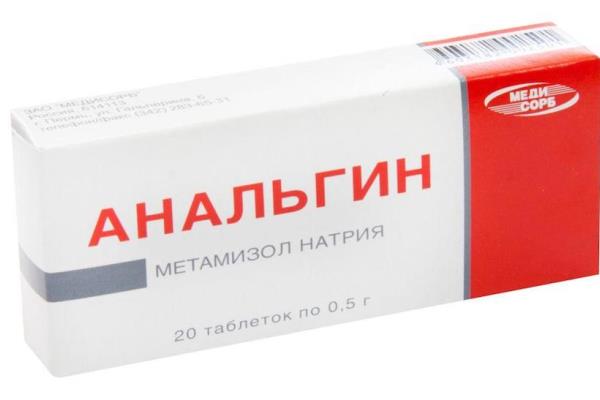
The situation looks different for a nursing mother. Analgin will not harm the woman herself, but it passes into breast milk. Although the percentage of drug penetration is only 1.5%, pharmacists recommend refraining from feeding for at least 2-3 hours, or even a day. During this period, the milk is strained and poured out.
It is advisable for a nursing mother to take Analgin after the baby has eaten. After two hours, the drug will already be removed from the woman’s blood, so you need to maintain this necessary time interval.
By the way, in many countries Analgin is prohibited for release and sale, since, according to experts, it poses a potential threat to health.
Analgin and breastfeeding
The instructions for the drug contain information about persons who are prohibited from taking it. These include pregnant women and infants under three months. Analgin should also not be taken while breastfeeding. This prohibition is explained by the fact that the medicine easily passes into breast milk and, therefore, affects the baby.
According to the observations of doctors, in children whose mothers used analgin for at least one day while breastfeeding, the following allergic reactions appeared in 85% of cases:
- rash;
- red spots.
In addition, the following reactions were recorded in children:
- increased number of regurgitations;
- poor sleep;
- disturbances in the functioning of the nervous system;
- inhibition of the formation of leukocytes and platelets;
- problems with kidney function;
- the appearance of signs of intoxication of the body.
Danger for baby
Before taking an Analgin tablet, a nursing mother should know what harm the medicine can have for the baby:
- the appearance of diarrhea;
- regurgitation;
- skin rashes, red spots, rash, hives;
- peeling of the baby's skin;
- cold sweat;
- blue discoloration of mucous membranes;
- swelling of the baby's throat and face;
- anaphylactic shock;
- spasms in the bronchi;
- loss of consciousness due to lack of oxygen;
- difficulty breathing.
Combination medications with Analgin may contain caffeine, which causes insomnia in the baby, and codeine can negatively affect the baby’s nervous system.
But remember, these are only possible negative reactions of the baby to Analgin and they will not always manifest themselves. But mom should be warned.
Storage conditions and terms
Analgin should be placed in a dark place. Store at temperatures above 25 degrees.
The shelf life is five years. Periodically, you need to audit your first aid kit and throw away medications that have expired the shelf life indicated on the packaging.
Analgin, like any other medicines, should be kept out of the reach of children. Kids love shiny and rustling blisters with tablets and, through carelessness or curiosity, may drink the drug. If this happens, you need to urgently call an ambulance, where the child will have a gastric lavage.
Be careful and better hide the first aid kit away from the eyes of children!
Analogs

Considering all of the above, of course, every mother is interested in the question of whether Analgin during lactation can be replaced with safer drugs. The pharmaceutical industry offers the following medications approved for lactation:
- Paracetamol;
- Ibuprofen.
These drugs are even more effective than Analgin. They can handle both pain and fever. In addition, they have an anti-inflammatory effect. Paracetamol is also allowed for use during pregnancy.
In any case, you should not self-medicate. If you are breastfeeding, you should consult a doctor; he will determine the dosage allowed for taking the drug.
You can relieve toothache by rinsing with decoctions of sage and chamomile herbs.
High fevers for nursing mothers can be reduced at home by rubbing with alcohol or vinegar diluted with water. Teas with raspberries and rowan will also help. And other traditional medicines also cope with health problems without the use of drugs.
Reviews and prices
Today, Analgin still remains one of the popular antipyretic and painkillers. The drug is affordable. The cost of a blister for 10 tablets varies from 12 rubles and above. A package of 20 tablets will cost 50, maximum 90 rubles. It all depends on the pharmaceutical plant, packaging and location of the pharmacy. Compared to other combination drugs, this is a pretty cheap price.
According to reviews, the consumer has strong confidence in Analgin. The “old and reliable” remedy can be seen in many car and home first aid kits. During the survey, about 79% of interviewees preferred Analgin, the remaining 21% were simply afraid of possible side effects.
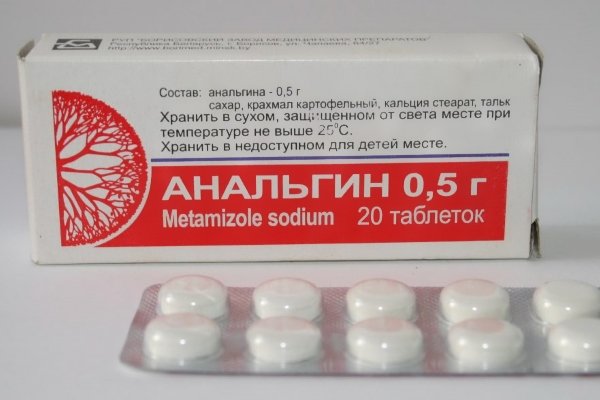
Even now, ambulance doctors give an injection of Analgin with Diphenhydramine in case of fever, including for small children.
Each of us must consciously understand that Metamizole sodium is used only symptomatically - it eliminates pain or fever at the time of its occurrence. Analgin does not cure and cannot be used like antibiotics, homeopathic medicines and other medicines, like “three times a day for 7 days”. Purulent tonsillitis, acute otitis media or pneumonia will not go away from swallowing Analgin. You need to consult a doctor who will make a diagnosis and take a deeper look at the problem.
Let's summarize. Is it possible to use Analgin while breastfeeding or not? Mothers should use this drug with caution, because it has the potential for potential harm to the baby. It is better to relieve pain or fever with safer medications.
But if only Analgin is nearby, it is important to follow the instructions that will minimize the concentration of metamizole sodium in mother’s milk and make breastfeeding safe.
- Related Posts
- Constipation during lactation in a woman
- The harmful effects of Aspirin during breastfeeding
- Is it possible to drink calcemin while breastfeeding?
« Previous entry
Analgin during breastfeeding
Analgin is a non-narcotic analgesic. It is used to relieve pain of various types (genesis) and normalize high body temperature that occurs against the background of infectious and inflammatory diseases.
However, it also has contraindications and side effects that you need to know before starting therapy during lactation.
Read our article about whether Analgin can be taken while breastfeeding and how this will affect the baby.
Action of Analgin
The drug has an analgesic effect, lowers high body temperature, and stops the inflammatory process. It has antispasmodic activity against smooth muscle tissue of the urinary and biliary tract.
The anti-inflammatory effect is not very pronounced and has little effect on water-electrolyte metabolism and the mucous membrane of the digestive tract.
Analgin prevents the transmission of pain signals through the thin and cuneate fasciculi, causing the brain to become less sensitive to pain.
Analgin blocks pain impulses in the brain
During treatment with medication, heat transfer increases.
Composition of the drug
The active ingredient is metamizole sodium.
Analgin is produced by several companies, so the composition of its excipients may differ, which should be taken into account by patients prone to allergies.
How does Analgin affect lactation and the child?
Analgin during breastfeeding does not affect lactation, but it can change the taste of mother's milk, which is why the child may begin to refuse the breast and become capricious.
In addition, metamizole sodium can cause the above-mentioned adverse reactions in an infant.
The adult dosage of the drug for a child is too high and can cause poisoning.
What forms are allowed during breastfeeding
Release forms of Analgin
Analgin is contraindicated during breastfeeding, regardless of the form of release. Metamizole sodium metabolites pass into mother's milk.
In addition, women who support breastfeeding should not use medications containing metamizole sodium:
- Baralgin M;
- Pentalgin-N;
- Pentalgin-ICN;
- Baralgetas;
- Took;
- Maxigan.
Negative consequences of taking Analgin
When nursing mothers take Analgin during breastfeeding, metamizole sodium metabolites enter the baby's body with milk.
Most often, due to painkiller treatment, a child develops pathologies of the liver and kidneys.
The medication may have a negative effect on the process of hematopoiesis, which will lead to changes in blood composition.
Negative effects from the respiratory system occur less frequently:
- bronchospasm;
- breathing disorder;
- unconsciousness caused by hypoxia.
One of the reasons for the ban is allergies.
Women who took Analgin during breastfeeding noticed signs of allergies in their child. After feeding, the baby’s skin began to peel off, rashes and red spots appeared on it.
The use of Analgin during breastfeeding can cause more dangerous allergic reactions, including anaphylaxis. It manifests itself with the following symptoms:
- pale skin;
- cyanosis of mucous membranes;
- hypotension;
- arrhythmia;
- breathing problems;
- cold sweat;
- swelling of the larynx and face.
If signs of anaphylaxis appear, you should immediately call an ambulance, as this condition is life-threatening and without timely medical attention can lead to the death of the baby.
If taking Analgin is unavoidable
If you need to use Analgin during lactation, it is recommended to interrupt breastfeeding and resume it only after 48 hours, after taking or administering the last dose of the painkiller.
In tablets, the drug can be taken 250-500 mg at a time. The frequency of administration is 2 or 3 times a day. You can take no more than 1 g at a time, the highest daily dosage when taken orally is 3 g.
If the medicine is administered intramuscularly or intravenously, the single dosage can vary from 250 mg to 500 mg. Injections can be done 2-3 times a day. The highest single dosage in injections is 1 g, daily dosage is 2 g.
When using Analgin, you need to consider the following:
- when used in combination with NSAIDs and other antipyretic and analgesic drugs, a mutual increase in toxic effect may be observed;
- inducers of microsomal liver enzymes may weaken the effect of the analgesic;
- sedatives and tranquilizers enhance its analgesic effect;
- when used simultaneously with phenothiazine derivatives, severe fever may occur;
- tricyclics, allopurinol, oral contraceptive pills increase its toxicity;
- metamizole sodium displaces indirect anticoagulants, glucocorticoids, indomethacin, and oral hypoglycemic medications from compounds with proteins, resulting in an increase in their activity;
- caffeine enhances its effect;
- metamizole sodium reduces the content of cyclosporine in the body;
- when used simultaneously with pitofenone hydrochloride, which relaxes the smooth muscles of internal organs, and with fenpiverinium bromide, which is an m-anticholinergic blocker, a synergistic effect is observed, as a result of which pain goes away, the temperature drops, and the smooth muscles relax.
What can replace Analgin?
If pain or fever occurs during lactation, you can take medications containing ibuprofen (Mig 400, Faspik, Nurofen) and paracetamol (Panadol, Efferalgan).
Read more about what painkillers you can take while breastfeeding
These medications can be taken to relieve headaches, dental, joint, muscle, menstrual and other types of pain. They also lower body temperature.
In addition, for pain caused by pathologies of the musculoskeletal system, you can use external dosage forms that contain diclofenac as an active ingredient, for example, Ortofen ointment, Voltaren Emulgel, Diclovit gel.
Conclusions: Is it possible to take Analgin during lactation?
- Analgin is prohibited for use in any form during breastfeeding!
- If treatment with Analgin is necessary, then be sure to interrupt breastfeeding.
- You can return to it at least 2 days after taking or administering the last dosage of the painkiller.
- As an alternative, you can use drugs based on ibuprofen and paracetamol.
Source: https://Detky.ru/mama/zdorovje-mamy/analgin-pri-grudnom-vskarmlivanii

